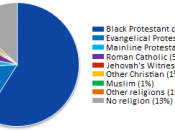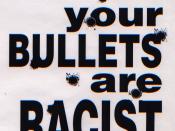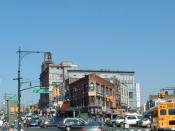Inequality: Race, Crime, and the Law
Policing and punishment in America is hardly colorblind. It is not a coincidence that minorities serve longer sentences, have higher arrest and conviction rates, face higher bail amounts, and are more often the victims of police use of deadly force than white citizens. When it comes to criminals, many people have a preconception of what a criminal is. Usually when people think of a criminal they picture a Black or Latino face. The thought of an Asian criminal is often related to Asian gangs. Interestingly enough, White people as a group are rarely associated with the thought of crime, even though they account for 70% of arrests and 40% of the prison population each year (Russel xiv). This seems to be overlooked, though, when people consider their stereotypical views. Minorities have become victims of these stereotypes in the U.S. courts by judges and juries as well as in their neighborhoods by local police.
When asking for fairness, the desire isn't for more rights for the criminally accused, yet for those rights of the accused to be fairly executed, before they are found guilty or innocent. This being because the system is unfair, it seems to be two different systems: one for the privileged, and one for the less privileged. Cops use methods of investigation and interrogation against minorities and the poor that wouldn't be accepted against more privileged citizens. Courts assign public defenders to the poor in serious criminal trials that a rich person wouldn't hire to defend them in a traffic court. Many minorities walk into a courtroom with the feeling that they are guilty until proven innocent. The complexion of their skin is too often viewed as negative. There is no doubt what the reason for it is.
The evening news often...



Excellent Ideals and Good foundation of the reality of the CJS
"When asking for fairness, the desire isn't for more rights for the criminally accused, yet for those rights of the accused to be fairly executed, before they are found guilty or innocent."
8 out of 8 people found this comment useful.